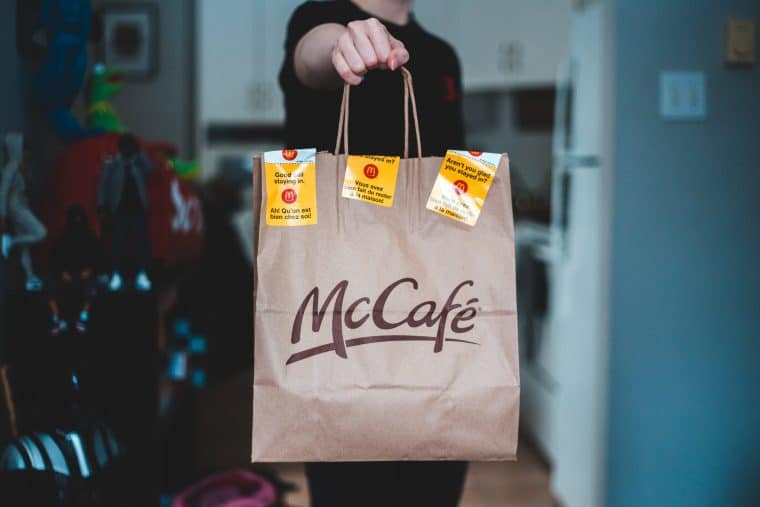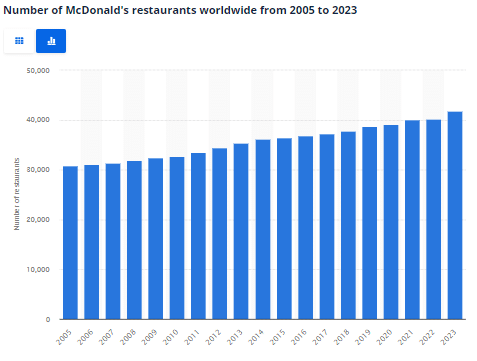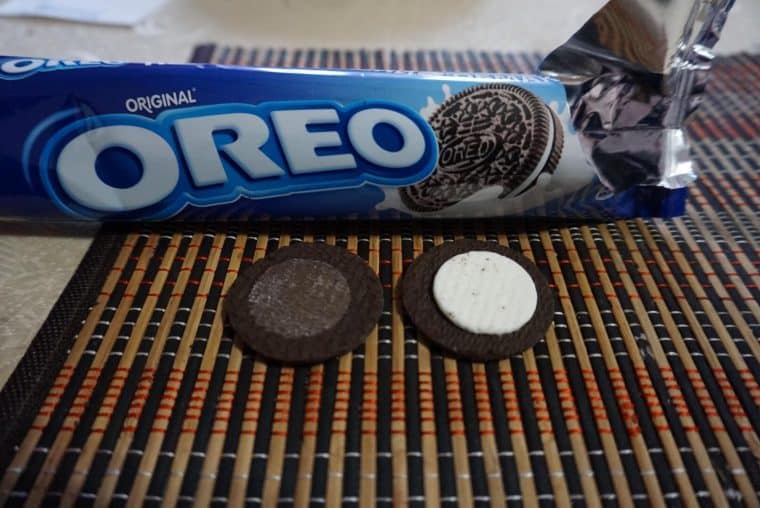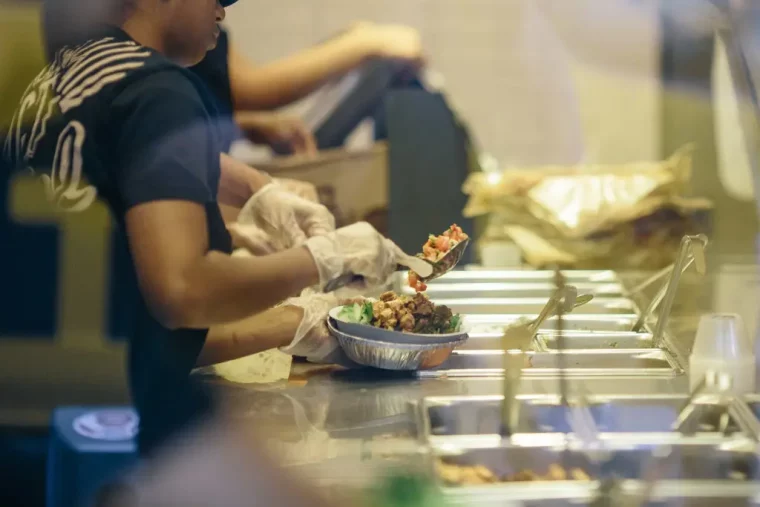The last decade has witnessed remarkable growth in the food and beverage industry, with increasing demand for healthier foods and variety in the range of products offered by the biggest food companies.
The significance of understanding industry leaders, such as the Swiss-based conglomerate Nestlé, lies in their ability to set trends and standards that shape the global market.
Here, we offer you valuable insights into the most important and valuable food and beverage companies, using market capitalization as the primary measure of company size.
With a focus on industries ranging from pet food to dairy products and beverage production, the list aims to provide our readers with a comprehensive overview of leading food company giants.
Top 10 Largest Food Companies in the World
- Nestlé: The largest food company globally, known for its extensive brand portfolio and significant market influence.
- McDonald’s: Renowned for its fast-food chains worldwide, with a recent focus on healthier menu options and rapid expansion plans.
- Unilever: A major player in consumer goods with a strong emphasis on sustainability and a wide range of food products.
- Mondelez International: Famous for brands like Oreo and Cadbury, with a growing focus on sustainable packaging and operations.
- Chipotle Mexican Grill: Pioneering fast-casual dining with a commitment to organic and sustainable ingredients.
- Hindustan Unilever: Dominates the Indian market with a broad portfolio and significant revenue growth.
- DoorDash: Leading the food delivery service market in the US, with substantial revenue growth driven by consumer demand.
- Kraft Heinz: Known for iconic brands and faced with legal and financial scrutiny over accounting practices.
- Danone: A major dairy company investing in sustainability, with a focus on reducing its carbon footprint.
- Compass Group: The largest contract food service company, serving a vast array of clients worldwide despite recent challenges.
The World’s 10 Biggest Food Companies: A Deep Dive
The global food and beverage industry is a colossal sector with the world’s largest food companies contributing significantly to its economy.
Collectively, the ten giants below have a combined value that surpasses over a trillion dollars, highlighting the sector’s vast economic impact and its critical role in global food security and innovation.
1. Nestlé – $279.32 Billion
Based in Switzerland and founded in 1866, Nestlé is not just the largest food company in the world but also one of the oldest.
It currently stands as the 37th most valuable company globally by market cap. Revenue reports from 2023 indicated a figure of $103.9 billion, or 93.35B CHF for the financial year.
Nestlé’s portfolio includes over 2,000 food and beverage brands, including familiar names like Nestea, Nespresso, Buitoni, Nesquik, Perrier, Chocapic, and Crunch.

Amid California’s drought, Nestlé Waters North America (now BlueTriton) faced accusations of excessive water extraction, prompting state officials to issue a draft cease-and-desist letter in April 2021. The controversy centered on claims of environmental depletion and violations of water collection permits.
It has faced a raft of other accusations of malpractice and unethical corporate behavior, such as:
- Promoting baby milk formula to parents in developing countries, compromising infant health. New standards of baby formula advertising were introduced following the scandal.
- Accusations of buying products from cocoa farms that used child and slave labor in West Africa. A 2021 court case was dismissed due to lack of proof the plaintiffs had worked on the plantations named in the suit.
- A range of E.coli and salmonella outbreaks in factories around the globe, and other contaminants in food, calling into question the company’s attitudes towards food safety.
The company’s stock is traded on the Swiss SIX exchange.
| Company Name | Nestlé |
| Headquartered In | Vevey, Switzerland |
| Market Cap USD (Billion) | 279.32 |
| Founded In | 1866 |
| Stock Symbol | SWX:NESN |
| Investments | 14 |
| Acquisitions | 38 |
2. McDonald’s – $204.72 Billion
Founded in 1940 in San Bernardino, California, McDonald’s has grown to become the world’s largest chain of fast-food restaurants.
With an annual revenue report in 2023 indicating an income of $25.49 billion, it’s renowned for its burgers, fries, and global presence, with over 41,800 locations in more than 100 countries.

In addition to its iconic menu items, McDonald’s has adapted its offerings to cater to changing consumer preferences, such as introducing plant-based options like the McPlant burger in select markets.
It had come under fire historically due to its association with unhealthy food. Famously, the documentary Super Size Me showed the effects of one person eating exclusively McDonald’s food for 30 days. The company unveiled salad and fruit options soon after to address the calorie count in its products.
McDonald’s is entering its most rapid expansion phase in 2024, aiming to unveil nearly 10,000 new restaurants by 2027.

| Company Name | McDonald’s |
| Headquartered In | Chicago, Illinois, USA |
| Market Cap USD (Billion) | 204.7 |
| Founded In | 1940 |
| Stock Symbol | NYSE:MCD |
| Investments | 2 |
| Acquisitions | 5 |
3. Unilever – $125.24 Billion
Unilever’s roots can be traced back to the 19th century, with its formation through the merger of Margarine Unie and Lever Brothers in 1929.
Based in London, it generated $66.23 billion of revenue in 2023, producing a wide range of consumer goods in the food and beverage industry as well as personal care and cleaning products.
The company owns a range of household brands which it has acquired over the years. Household food industry names include:
- Hellman’s mayonnaise
- Ben & Jerry’s ice cream
- Knorr stocks and sauces
- Horlicks drinks
- Wall’s ice cream
In 2022, Unilever faced intensified scrutiny for its claims of prioritizing sustainability, particularly amidst criticism from major investors like Fundsmith LLP.
The heightened attention has led to increased questioning of the company’s ability to balance its sustainability initiatives with its financial performance objectives effectively.
| Company Name | Unilever |
| Headquartered In | London, England |
| Market Cap USD (Billion) | 125.24 |
| Founded In | 1872 |
| Stock Symbol | NYSE:UL |
| Investments | 2 |
| Acquisitions | 46 |
4. Mondelez International – $97.49 Billion
Mondelez International, born from the 2012 spin-off of Kraft Foods, is headquartered in Chicago. The company, known for brands like Oreo, Cadbury, and Toblerone, reported revenues of $36.02 billion in 2023.
Mondelez has also been investing in sustainable and eco-friendly initiatives, such as launching recyclable packaging by 2025.
In 2023, many lovers of Oreo cookies accused Mondelez of reducing the amount of creme filling between the chocolate wafers. The controversy emerged as consumers were becoming increasingly vigilant about “shrinkflation” in iconic brands.
Mondelez was also named as a defendant in the same court case as Nestlé regarding the use of child labor in cocoa plantations. The company has also been named as an “international sponsor of war” due to its ongoing operations in Russia by Ukraine’s National Agency for the Prevention of Corruption. Vinzenz Gruber, Mondelez’s European president, responded by saying, “If you look in most kitchen cupboards, you will see many products from food and beverage companies that have not exited Russia.”

| Company Name | Mondelez International |
| Headquartered In | Chicago, Illinois, USA |
| Market Cap USD (Billion) | 97.49 |
| Founded In | 1903 (Kraft Foods) |
| Stock Symbol | SWX:MDLZ |
| Investments | 5 |
| Acquisitions | 11 |
5. Chipotle Mexican Grill – $79.03 Billion
Chipotle, founded in 1993 in Denver, Colorado, has revolutionized the fast-casual dining experience with its focus on organic and sustainable ingredients.
The brand’s commitment to “Food With Integrity” has not only set a standard in the industry but also fostered a loyal customer base. Thanks to this, in 2023, Chipotle reported revenues of $9.87 billion, reflecting its growing influence and popularity among health-conscious consumers.
Chipotle revolutionized fresh fast food. Rather than relying on reheating frozen meals like conventional chain food service, Chipotle runs a production-line model that allows for the preparation of food so it’s ready when needed and clear roles for workers to ensure efficient service. There is also a focus on a simple yet customizable menu, strong people policies, and good supply chain integrity.
In 2020, Chipotle Mexican Grill agreed to pay $25 million to settle criminal charges over tainted food, resulting in over 1,100 illnesses from 2015 to 2018.
The company admitted fault and will comply with an improved food safety program to avoid conviction, with prosecutors emphasizing the importance of consistent adherence to food safety policies in the industry.
| Company Name | Chipotle Mexican Grill |
| Headquartered In | Newport Beach, California, USA |
| Market Cap USD (Billion) | 79.03 |
| Founded In | 1993 |
| Stock Symbol | NYSE:CMG |
| Investments | 5 |
| Acquisitions | 0 |
6. Hindustan Unilever – $63.35 Billion
Founded in 1931 as Hindustan Vanaspati Manufacturing Company, Hindustan Unilever emerged after a company merger in 1956. It is the largest consumer goods company in India and a subsidiary of Unilever. With over 35 brands in its portfolio, including Boost energy drinks, Lipton tea, Cornetto ice cream, and Kissan foods and drinks, it caters to the diverse needs of Indian consumers.
In 2023, Hindustan Unilever reported revenues of $7.45 billion, approximately an 8% increase from 2021.
With plans to expand its product portfolio and invest in research and development, Hindustan Unilever is set to maintain its dominance in the Indian market. As it stands, 90% of Indian households use Unilever products and they can be found in over 9 million retail outlets across the country.
In 2020, the company encountered controversy over one of its brands, ‘Fair and Lovely’. Hindustan Unilever renamed its skin-lightening cream to ‘Glow & Lovely’ due to criticism for reinforcing negative stereotypes about darker skin tones.
| Company Name | Hindustan Unilever |
| Headquartered In | Mumbai, Maharashtra, India |
| Market Cap USD (Billion) | 63.35 |
| Founded In | 1956 |
| Stock Symbol | NSE:HINDUNILVR |
| Investments | 2 |
| Acquisitions | 6 |
7. DoorDash – $55.45 Billion
DoorDash was founded in 2013 and has since risen to become the leading food delivery service in the United States, earning 67% of consumer’s meal delivery sales in 2024. Uber Eats was in second place with 23% of the market share.
With its widespread availability and convenience, DoorDash has been able to capitalize on the increasing demand for food delivery services, especially during the COVID-19 pandemic.
In 2023, DoorDash made a total revenue of $8.64 billion, representing approximately a 27% growth from the previous year. As the company continues to expand into new markets and diversify its services, its value in the market is expected to continue rising.

DoorDash released a feature in 2023 that pressured customers to tip delivery drivers, warning of potential delays for orders without tips, as part of the company’s efforts to address fair pay concerns for gig workers. Naturally, the company could simply pay its drivers more but decided that offloading that cost onto users was better for its bottom line.
Despite some customer annoyance, the change aims to clarify that tips directly contribute to the delivery person’s earnings, potentially reducing orders without tips.
| Company Name | DoorDash |
| Headquartered In | San Francisco, California, USA |
| Market Cap USD (Billion) | 55.45 |
| Founded In | 2013 |
| Stock Symbol | FRA:DD2 |
| Investments | 5 |
| Acquisitions | 7 |
8. Kraft Heinz – $43.49 Billion
Kraft Heinz, formed in 2015 through the merger of Kraft Foods and H.J. Heinz Company, is one of the largest food and beverage companies in the world.
The company operates in over 40 countries, offering a wide range of famous brands and products such as ketchup, condiments, snacks, and dairy products. Two of its iconic products include Heinz Ketchup and Kraft Mac & Cheese.
It has 78 food production and packaging factories around the world, including the world’s largest baked bean factory in the UK. In the US, it is estimated that more than one million boxes of the famous Macaroni and Cheese are sold each day.
In 2023, Kraft Heinz reported revenues of $26.64 billion.
Kraft Heinz faced charges from the SEC for a years-long accounting scheme that led to inflated financial reporting, resulting in a $62 million settlement. Former executives were also charged for their roles in the misconduct, facing penalties and restrictions.
| Company Name | Kraft Heinz |
| Headquartered In | Mendota, Minnesota, USA |
| Market Cap USD (Billion) | 43.49 |
| Founded In | 2015 |
| Stock Symbol | NASDAQ:KHC |
| Investments | 2 |
| Acquisitions | 6 |
9. Danone – $41.25 Billion
Danone, a French multinational food-products corporation founded in 1919, is one of the world’s largest dairy companies. It has a diverse portfolio of products, including water, baby food, and plant-based alternatives.
Danone reported revenues of $29.62 billion in 2022.
The company has also been investing in sustainable practices and reducing its carbon footprint, which has helped it maintain a positive image among consumers who are increasingly conscious of the environmental impact of the products they consume.
According to its 2021 financial report, Danone used over 750,000 metric tons of plastic, primarily in water bottles, yogurt containers, and other packaging. This number is equivalent to approximately 74 times the weight of the Eiffel Tower.
| Company Name | Danone |
| Headquartered In | Paris, France |
| Market Cap USD (Billion) | 41.25 |
| Founded In | 1919 |
| Stock Symbol | OTCQX:DANOY |
| Investments | 4 |
| Acquisitions | 13 |
10. Compass Group – $38.68 Billion
Compass Group, founded in 1941 and headquartered in the UK, is the world’s largest contract food service company. With operations in over 45 countries, it serves over 5.5 billion meals annually.
In 2020, Compass Group reported approximately a 50% decrease in market cap, reflecting the impact of the COVID-19 pandemic on its business. Despite this, Compass Group has consistently performed well over the years, with its focus on providing high-quality food services to a wide range of clients, including:
- The Pentagon
- Nike
- Coca-Cola
In 2021, Compass apologized for providing inadequate free school meal parcels to UK schoolchildren who qualified for free meals at home during the pandemic. The company faced challenges amid supply uncertainties and cost-cutting measures to protect margins.
| Company Name | Compass Group |
| Headquartered In | Surrey, England |
| Market Cap USD (Billion) | 38.68 |
| Founded In | 1941 |
| Stock Symbol | LSE:CPG |
| Investments | 3 |
| Acquisitions | 26 |
Learning From the Biggest Food Companies in the World
The path to growth and success in the food industry is multifaceted, as demonstrated by the diversity of the world’s leading companies. These giants have leveraged a range of strategies, including significant investments in research and development (R&D), to innovate and meet changing consumer preferences for healthier and more sustainable options (without eliminating popular unhealthy options).
Strategic acquisitions have allowed them to diversify their product lines, enter new markets rapidly, and buy out competing brands. Companies like Mondelez International and Nestlé have become household names not just through organic growth but also by buying up competitors and complementary businesses, thereby expanding their global reach and product assortment. Proactively responding to consumer needs and trends has also helped keep companies like McDonald’s and DoorDash keep their tremendous leads in the sector.
For emerging businesses in the food sector, these strategies underscore the importance of staying adaptable and responsive to market trends. While direct competition with these behemoths may be unrealistic for smaller entities, the underlying principles can guide their growth paths.
Focusing on niche markets, leveraging technology for product innovation, and considering strategic partnerships can provide a solid foundation for growth. Ultimately, understanding consumer needs, committing to sustainability, and continuously innovating are key lessons to draw from these global leaders.



